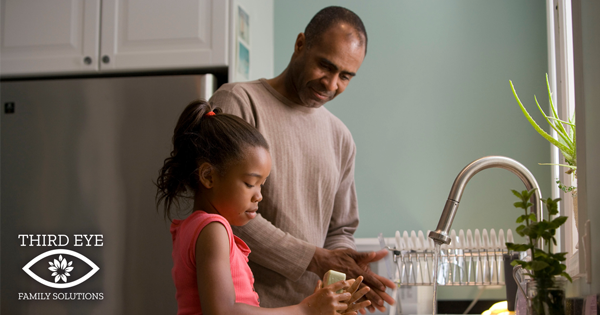By definition, punishment means inflicting a penalty, while discipline means training that improves a skill. There are other definitions (a discipline can be something that you actively engage in, for example), but these are the most relevant to these discussions.
Essentially, punishing your child means doling out a consequence, while disciplining them means helping them learn skills. If you stop to think about it, the idea that the phrase many of us heard growing up – “that will teach you!” – is ludicrous.
Punishment doesn’t teach us the skills we need to do better in the next troubling circumstances. It may teach us to avoid getting caught or to avoid the behavior, but it doesn’t teach us how to think things through and make better choices next time.
Discipline, on the other hand, is all about learning the skills children need to become critical thinkers who make the right choices because they are the right choices, not out of fear of being in trouble.
Discipline also comes from connection. We have to be connected to our children in order to teach them. Anger and frustration are human, but they get in the way when we want to help our children learn. You cannot teach a dysregulated child (one who is upset, crying, angry, etc) and you cannot teach while you yourself are dysregulated!
Often, when we look to the heart of challenging behaviors, we can identify a lack of skills that led to them. It can be difficult to pinpoint what skills are missing at times, but they are always there.
Here are some examples that may be useful to see ways that we can discipline our children and youth instead of punish them.
Example 1: Your 4-year-old Jane is playing with a friend and takes a toy from her. The friend is now crying.
Missing Skills:
Four year olds are great at sharing.
Developmentally, they are still in a stage of learning about waiting and the reality that the toy will still be there for them later. When we say share, the child hears ‘give up what you want to someone else,’ which isn’t a very appealing idea!
There is also a lack of communication skills at this age.
If the toy is very special to your child, they don’t have the skills to say “Hey friend, that toy is really meaningful to me, would you mind playing with this other one instead?” Even if they could say this, the other child likely hasn’t yet developed a sense of empathy that would have them understand this.
Punishment Responses:
Take the toy away from your child and give it back to the friend. Scold her about sharing. Say “if we can’t share we are going to end our playdate.”
Discipline Responses:
In the moment, you could say “Jane, your friend is crying because you took away the toy. Is there another toy we could give her to play with?” (this response helps Jane link the friend’s tears with her actions as well as problem solve how to play together and attend to the friend’s feelings).
A proactive response would have been even more helpful – helping Jane decide before the play date if there are any toys she does not want her friend to play with and putting them away could have bypassed the entire incident. Doing so both allows Jane to think through her wants and empowers her to know that you respect her boundaries surrounding her toys. Feeling empowered will likely make Jane feel more comfortable about sharing the toys that are out for the playdate.
Example 2: Your 10-year-old promised to clean his room but it’s still a mess
Missing Skills:
Organization skills are not at the top of the list for children at 10.
While some children will develop this on their own, many children need to be taught these skills. There may also be an experience of feeling overwhelmed, such as not knowing where to start in a giant mess. Learning how to deal with these feelings is also important.
Punishment Responses:
Yelling about the mess. Taking away privileges until the room is clean. Taking away allowance money.
Discipline Responses:
Asking “What happened? And then REALLY listening as your son recounts how he felt or what his experience is.
At 10, he will have a decent idea of what kept him from cleaning the room. Address what he says, and offer to work as a team to clean up the room. Working side by side, you can teach him ways to keep things neat that he probably wouldn’t have thought of on his own.
A proactive approach would involve helping him create a space free from clutter, with only things that he really wants and needs in his room. Teaching skills such as cleaning up before moving on to another activity is helpful, as well as providing spaces such as a desk for projects that can’t really be put away.
The Key to Discipline in Parenting Rather than Punishment is to Practice
Neither of these examples begins to cover the wide range of challenges we face as parents each day, but hopefully they illuminate a bit some ways that you can shift your parenting away from punishment and towards discipline.
Often I hear parents say “If I don’t punish her, she doesn’t listen.” I invite you to think about that this way – if your children are used to being punished, they might not listen otherwise. However, with consistent discipline over time you can change the way you work with them, you can change the way you trained them.
Another pitfall parents often fall into is the “I have to dole out a consequence or they will think I am a push-over.” This thinking often comes from the ways that we were raised, rather than real life experience.
The happiest, most respectful and well-mannered children I know have been raised by parents who are committed to teaching them the skills that they need. These children know that when they make mistakes their parents will listen, help them process the mistakes, and support them in their learning process.
Through discipline, parents become a ‘safe space’ rather than the place where punishment happens. It takes time and focused effort to change your relationship dynamics, but the outcomes are worth it!
Learn more about positive parenting approaches in a blog post here about Time-Ins instead of Time Outs, and Helping Your Children Understand Consequences.
If you or your family is in need of support to create a healthier family environment at home, either between you and your children, or your children and their siblings. We may be able to help.
Schedule a free consultation today where we can review your unique needs and concerns >


Recent Comments